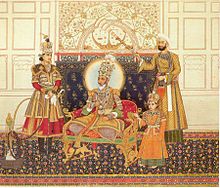Mirza Mughal
| Mirza Mughal | |
|---|---|
| Shahzada of the Mughal Empire | |

Bahadurshah Zafar with this two sons - Ten-year-old Mirza Mughal (standing at right side of the image) and Mirza Fakhru (at left side of the image)
|
|
| Born | 1817 Red Fort, Delhi, Mughal Empire, now India |
| Died | 22 September 1857 (aged 39–40) Delhi, Mughal Empire, now India |
| House | Timurid |
| Father | Bahadur Shah II |
| Mother | Sharif-ul-Mahal Sayyidini |
Sultan Muhammad Zahir ud-din, better known as well Mirza Mughal (1817 – 22 September 1857), was a Mughal prince. He played a significant role during the Indian Rebellion of 1857. He was one of the captive Mughal princes shot dead at one of the gates of Old Delhi, which gate thereafter came to be known as "Khooni Darwaza" ("bloody gate" or "murder gate").
Mirza Mughal was the fifth son of Bahadur Shah Zafar, the 12th and last Mughal emperor. His mother, Sharif-ul-Mahal Sayyidini, came from an aristocratic Sayyid family that claimed descent from Muhammad.
Following the death in 1856 of his elder step-brother Mirza Fakhru, Mirza Mughal became the eldest surviving legitimately born son of Bahadur Shah Zafar. However, the British refused to recognize anybody as heir to the throne of Delhi, and indicated that the monarchy would be abolished following Zafar's death.
In May 1857, sepoys of the British Indian army rebelled against their British officers and streamed into Delhi. They made straight for the palace, apprised the Emperor of their grievances aqainst their British superiors, affirmed their allegiance to him, and sought sanctuary and leadership. A few days later, after taking stock of the situation, Mirza Mughal and some of his half-brothers petitioned their father to be appointed in charge of the rebel troops. Their plea was initially refused but later granted, and Mirza Mughal, as the senior-most legitimate prince, was designated commander-in-chief. Mirza Mughal had absolutely no training or experience for his new office. However, he energetically sought to organize the troops, make arrangements for their billeting and provisioning, and bring a semblance of order to the edgy city. His inexperience soon became apparent, and he was upstaged a few weeks later by the arrival, at the head of a large force from Bareilly, of Bakht Khan, a former non-commissioned officer (Subedar) in the British army, who had earned a fine reputation during the Afghan wars. Shortly after his arrival, the emperor appointed Bakht Khan commander-in-chief and left Mirza Mughal in charge of supplies. A few weeks later, following another reshuffle of offices, Mirza Mughal was given charge of administering the city of Delhi.
...
Wikipedia
